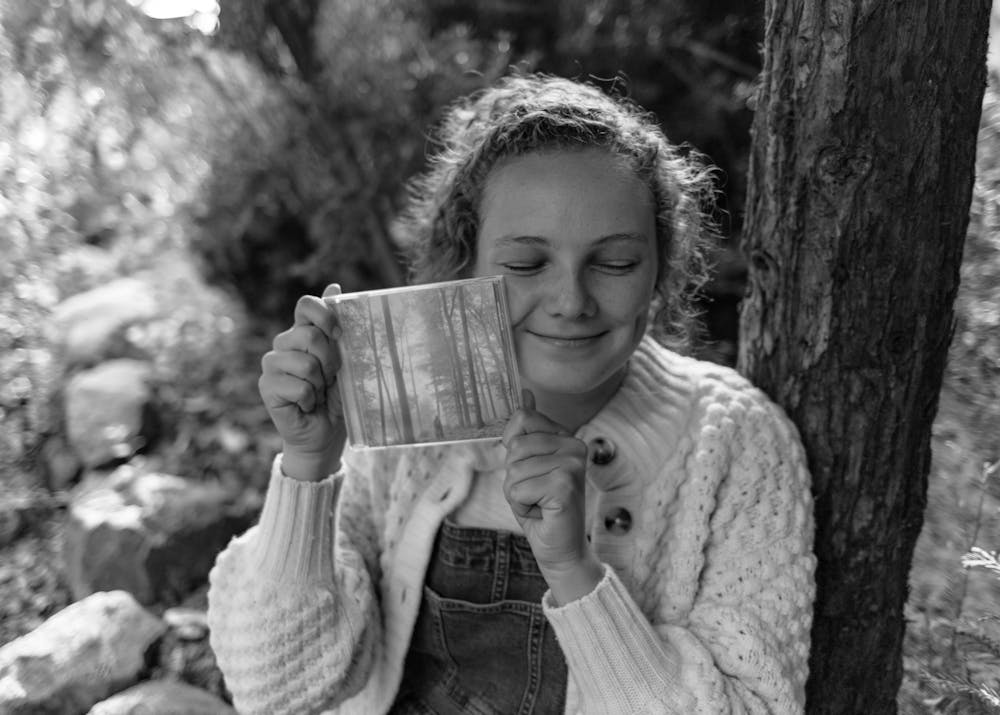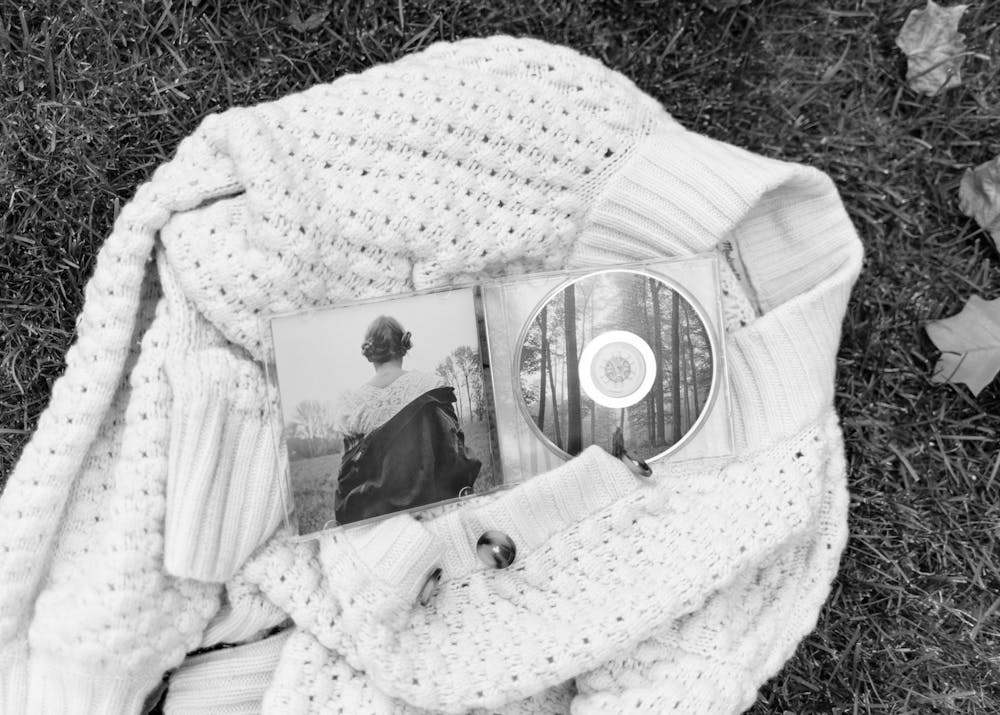I spent the majority of my time in quarantine yelling at politicians on my TV and baking obscene amounts of bread. Taylor Swift, on the other hand, spent her time writing a career-defining album.
Swift’s eighth studio album, “Folklore,” is a heartbreaking collection of songs inspired by made up stories. Although this album was released at the end of July, I had to wait to write a review for The Beacon, especially since “Folklore” rocks major autumnal vibes. If you’re looking for an album to spark a cathartic cleansing of emotions, this is the album for you. Do yourself a favor; light a candle, don your favorite cardigan and sit back while “Folklore” tells you tales of woe and wonder.

Lowney lovingly holds her copy of "Folklore" in a whimsical forest.
Photo Illustration by Molly Lowney
It arrived as a complete surprise when Swift announced her new album the day before its release on July 24. Unlike the bright pastels and easter eggs of “Lover,” the marketing for this album was uniquely nonexistent, opting out of releasing lead-up singles and leaving no room for predictions or preconceptions. Instead, Swift released the album as a cohesive experience -- one where the lyrics could speak for themselves.
“Folklore” is a reinvention of Swift as an artist. It not only switches from the bright pop on “Lover” to a reflective indie/alternative style, but pulls from worlds and stories outside of Swift’s firsthand experiences. This album is about storytelling, with Swift weaving narratives and themes effortlessly through her lyrics.
This is the first album she’s released since turning 30, and it brings a nuanced maturity to her songwriting. “Folklore” is born from Swift’s struggles over the past few years: her mother’s battle with cancer, winning a sexual assault lawsuit, finding her political voice, and leaving behind Big Machine Records and her master recordings.
It’s clear that Swift matured and learned from these events, emerging stronger, more serious and steadfast in her beliefs and work. “Folklore” is Swift’s departure from the quiet, obedient pop princess. Her songs are honest, raw and reflect a new self assured, empowered confidence in Swift’s songwriting.

Lowney imitates Swift's hairstyle from the "Folklore" album art.
Photo Illustration by Molly Lowney
She collaborated with Bon Iver, Jack Antonoff and the National’s Aaron Dessner on 17 unique tracks. The tone of the album is calm and subdued, from the dreamy, coming of age sound of “Mirrorball,” to the acoustic banjo in “Invisible String.” Instead of synths and hard hitting pop bops, “Folklore” communicates the same emotional intensity with simple production.
The album reads like a collection of short stories, drawing from both Swift’s personal experiences and the ones of the characters she created.
“The lines between fantasy and reality blur and the boundaries between truth and fiction become almost indiscernible,” Swift wrote in an Instagram post.
The album begins with “The 1”, a song about a lost love that could have been. (Did I mention that there are 5 explicit songs on the album? Unprecedented.)
Track 2 is called “Cardigan”, and acts as one part of the album’s teenage “love triangle”, according to speculation from fans. Swift supposedly created three characters -- Betty, James and an unnamed woman -- caught up in a messy love triangle. In “Cardigan”. Swift sings from Betty’s point of view. “Betty,” is written from the perspective of 17-year-old James, who tries to win Betty back after cheating on her (Not cool, James). The third girl in the love triangle is unnamed, but recounts her whirlwind summer romance with James in “August.”

The "Folklore" CD rests open on an old cardigan, found under someone's bed.
Photo Illustration by Molly Lowney
Track 3, “The Last Great American Dynasty,” is one of the standout stories on the album, where Swift tells the life story of Rebekah West Harkness, an heiress who previously owned Swift’s Rhode Island beach house. Track 4 and 5, “Exile”, featuring Bon Iver and “My Tears Ricochet”, are the kind of sad songs that you listen to on a solo walk in the pouring rain.
It’s impossible to capture how brilliant this album is in a short review, but here are some of best lyrical moments on “Folklore”:
“But I'm a fire and I'll keep your brittle heart warm/If your cascade, ocean wave blues come/All these people think love's for show/But I would die for you in secret” - Peace
“Cold was the steel of my axe to grind/For the boys who broke my heart/Now I send their babies presents” - Invisible String
“Don't call me ‘kid,’ don't call me ‘baby’/Look at this godforsaken mess that you made me/You showed me colors you know I can't see with anyone else” - Illicit Affairs
“I want auroras and sad prose/I want to watch wisteria grow right over my bare feet/'Cause I haven't moved in years/And I want you right here”- The Lakes
“Folklore” is my new favorite Taylor Swift album, knocking “Red” out of its long held title. Every single song on the album is good. Seriously. No mistakes were made. (*flashbacks to ME!*) The attention to detail, simple production and lyrical storytelling make it an immediate classic.
Obviously, “Folklore” made me cry, laugh and spend hours staring at my ceiling, contemplating my existence. This album is a masterpiece, a beautiful portfolio of Swift’s unparalleled songwriting.
Molly Lowney is a photographer for The Beacon. She can be reached at lowney21@up.edu.








